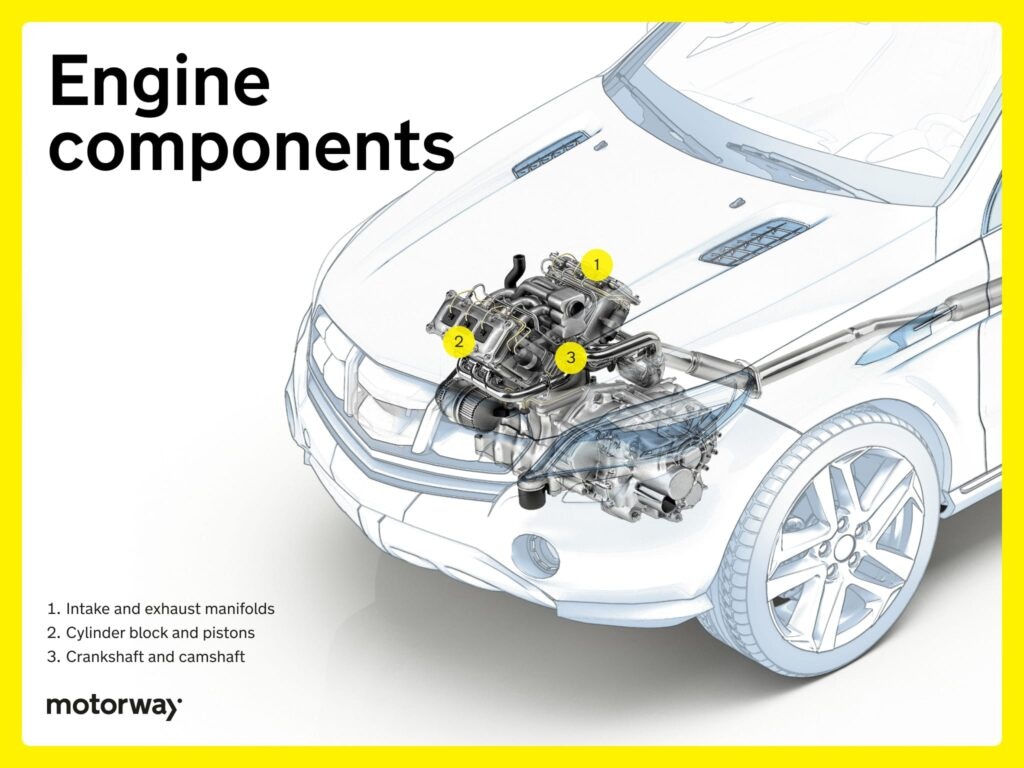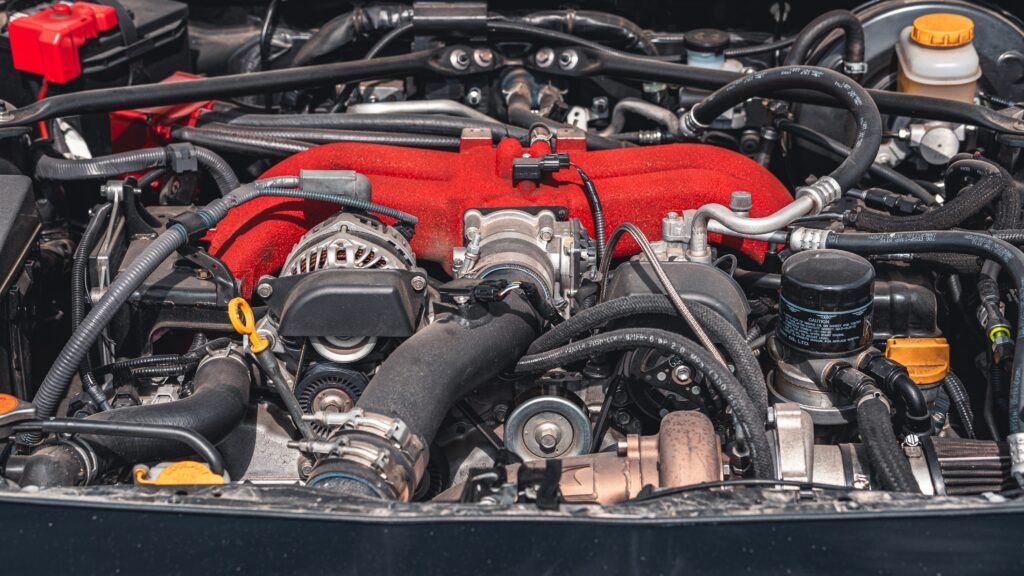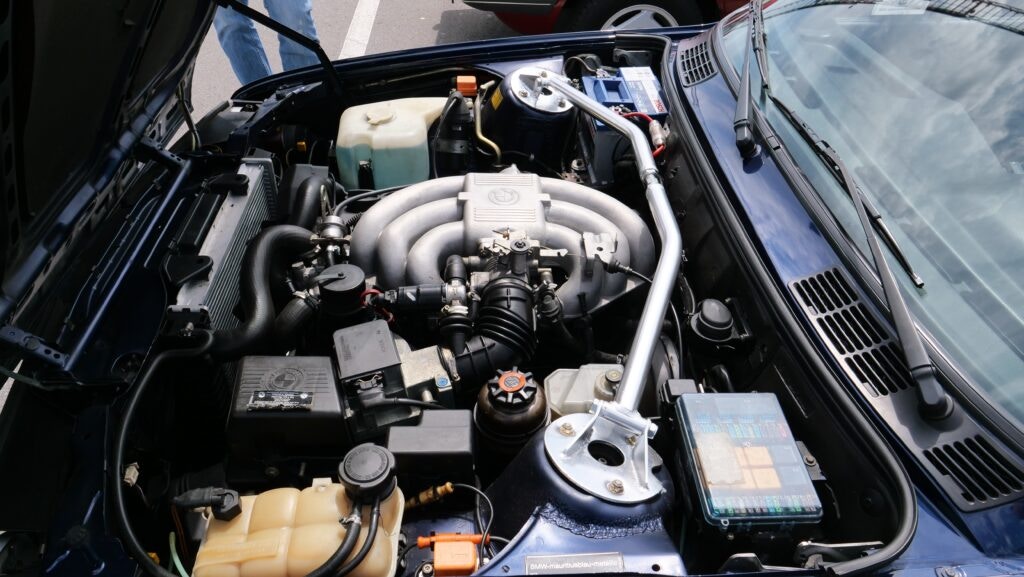How much does it cost to replace a car engine?
Without a car engine, you’re without a car. While replacing your engine can be a significant investment, it will boost your car’s performance and help you get a strong price when selling your vehicle.
On average, a full engine replacement can run anywhere between £1,500 and £5,000, depending on your car model and engine type.
Read on to learn more about engine replacement and see our detailed breakdown of factors influencing replacement costs.
- Factors impacting engine replacement cost
- Signs your engine needs replacing
- Engine replacement options
- Garage selection
- Financing options
- Extend your new engine’s life
- FAQs
Factors impacting engine replacement cost

Replacing your car engines an investment in your car’s performance and value.
Car model and make
Your vehicle’s brand and model significantly affects the cost of engine replacement. Imported luxury cars or cars with unique specifications generally incur higher expenses given the elevated prices of their parts.
Engine type and complexity
What type of engine do you have? What size is it? High-performance engines and ones with advanced features often have intricate components that can be more expensive to source and install, contributing to higher costs overall.
New vs. remanufactured engines
The choice between a brand-new engine and a remanufactured one has substantial cost implications. While a new engine is typically more expensive, opting for a remanufactured option provides a cost-effective alternative. Weigh the pros and cons of each to decide what’s best for your budget.
Labour costs and location
The labour price to remove and replace your engine varies with your location, as well as the expertise of the mechanics involved. Urban areas and specialised shops may command higher labour costs. Do your homework and collect multiple quotes to find a mechanic who fits your budget, without compromising on quality.

Additional repairs and components
Repairing a faulty engine may reveal additional issues that need fixing. Whether it’s a damaged radiator, malfunctioning exhaust system, or worn-out belts, engine repairs and an engine rebuild may add to the overall cost. A comprehensive inspection during the replacement process is crucial for identifying and resolving these concerns.
Signs your engine needs replacing

Overheating
Persistent engine overheating is a red flag that crucial car components may be damaged. Overheating can result from a malfunctioning cooling system, a faulty thermostat, or a damaged radiator. To prevent further damage, it’s crucial to replace your engine once overheating is detected.
Unusual engine noises
Unusual sounds or knocking from your engine can also suggest internal damage, potentially due to worn-out bearings or piston issues. Ignoring these noises can lead to catastrophic engine failure – prompt investigation and action are essential.
Excessive oil consumption
An abnormal increase in engine oil consumption may indicate leaks or internal engine problems. Notice yourself frequently topping up your engine oil levels between regular maintenance intervals? Then it’s time to have your engine checked.
Engine misfires or power loss
Engine misfires or a noticeable loss of power are indicative of underlying issues, such as faulty spark plugs, ignition system problems, or internal engine damage. Ignoring these signs compromises performance and fuel efficiency. Always check the engine light if you have concerns.
Engine replacement options

Rebuilt engines vs. new engines
How do you choose between a rebuilt or new engine when replacing yours? Rebuilt engines are budget-friendly. Their components are repaired or replaced to meet specifications – just make sure that these specifications fit your car’s requirements!
New engines, on the other hand, offer pristine performance but come at a higher price tag. Consider your budget, desired longevity, and performance expectations when deciding.
Original Equipment Manufacturer (OEM) vs. aftermarket engines
There are trade-offs to consider when choosing between OEM and aftermarket engines. Designed by the vehicle manufacturer, OEM engines ensure compatibility and adherence to original specifications. Their higher pricing reflects this.
Alternatively, aftermarket engines may offer cost savings but could lack the same level of precision.
EVs vs. petrol car engines
With their simpler design and battery technology, Electric Vehicle (EV) engines are fundamentally different from petrol vehicles. With fewer moving parts, EV ones are less susceptible to malfunction and rarely need to be fully replaced.
Regular EV engine maintenance primarily involves the battery, which can be expensive to replace but has a longer lifespan than traditional options. If necessary, electric motor replacements run a much higher price tag than petrol engines. Advancements in battery technology are slowly reducing these costs, making EVs more cost-competitive.
The complex internal combustion engines of petrol and diesel cars are more prone to wear and tear than their EV counterparts. Petrol car engine replacements are therefore more common. While engine replacement costs vary based on the car model and engine type, engine replacement fees tend to be lower than EV fees, but add up over time.
Warranty and engine reliability
Warranty and reliability are paramount when it comes to car engine repair and replacement. Opting for a replacement engine with a solid warranty provides peace of mind and safeguards against unforeseen issues.
No one wants their engine to break on them. Selecting an engine with proven reliability ensures consistent performance and safeguards against the risk of future problems.
Prioritise engines with comprehensive warranties and proven reliability to ensure a durable and trustworthy replacement.

Garage selection
See below for our tips for researching and selecting a reputable mechanic or garage to replace your engine:
1. Gather a list of reputable garages in your area. Consider recommendations from friends, online reviews, and professional associations.
2. contact each garage for detailed engine replacement quotes. Quotes should include overall replacement cost, cost for different engine parts, labour, and any additional fees.
3. Inquire about the warranty for replacement engine and services. A transparent warranty indicates the garage’s confidence in its work.
4. Check the qualifications and certifications of the mechanics at each garage. Well-trained professionals are likely to provide a higher standard of service.
5. Review the quotes to understand what’s included and excluded. Some quotes may appear cheaper but could omit essential components or services.
6. Take into account each garage’s reputation. Positive reviews and a good track record indicate reliable service.
7. Don’t hesitate to negotiate quotes for your vehicle! Some garages may be willing to adjust pricing, especially if you present competitive offers from other establishments.
8. Consider the estimated time for engine replacement and the convenience of the garage’s location. A balance between quality, cost, and convenience is essential.
9. Make your decision based on overall value, not just the lowest cost. Factor in the reputation, warranty, included services, and professionalism of the garage.
Financing options
An engine is one of the most expensive parts of your vehicle to replace. However, there are a diversity of ways to pay for this essential component:
Insurance coverage and extended warranties
Does your car insurance cover engine replacement? What about your vehicle’s extended warranty? While comprehensive auto insurance protects against various damages to your vehicle, it may not cover engine failure from wear and tear.
However, extended warranties provide additional protection beyond the vehicle manufacturer’s warranty. This often includes engine replacement due to mechanical failures.
Replacing your car engine could also result in your insurer classing your vehicle as a category write-off.
Personal loans and financing plans
Personal loans and financing plans both provide flexible financing options for engine replacement, if repair is crucial but you can’t afford to pay upfront. Be sure to read the fine print before signing up to any financial product.
Many repair shops offer individual financing plans to ease the financial strain of car repairs. For example, monthly payments can spread the cost of engine repair over time, making it more manageable for a diversity of budgets.
Extend your new engine’s life
Regular oil changes and fluid checks
Defend against engine deterioration with consistent oil changes and fluid checks. Be sure to follow directions for optimal engine lubrication to preserve your engine’s health.
Cooling system and radiator maintenance
Giving the cooling system and radiator regular maintenance prevents overheating and engine damage.
Tune-ups and mechanic inspections
Frequent tune-ups and inspections by a qualified mechanic keep your engine in top condition. Addressing issues like worn-out spark plugs, faulty ignition systems, and other potential problems enhances efficiency, prolongs engine life, and prevents unexpected breakdowns.
More on how to look after your car can be found here.
FAQs
Is it worth replacing an engine in a car?
Deciding if engine replacement is worth it involves evaluating the car’s value, overall condition, and future performance. Weigh the costs against potential benefits to make an informed and financially sound decision.
However, if you’re looking to sell your car, replacing an old or damaged engine may help you get a fair price for your vehicle.
Is it easy to replace a car engine?
Replacing a car engine is complex and requires specialised expertise. Do not try this at home! Work with a professional mechanic to ensure the safe installation of your engine.
Do car insurance companies cover new engines?
While some insurance covers engine replacement resulting from accidents, most do not cover engine repair and coverage for wear and tear is less common. Insurance companies’ coverage varies, so carefully read your policy!
Does replacing an engine reset mileage?
No, engine replacement doesn’t reset mileage. The odometer retains the total mileage on the vehicle, providing an accurate historical record that includes the miles from before and after the engine replacement.
How long does it take a mechanic to replace an engine?
Most mechanics can replace a car engine in 5 to 10 hours under normal conditions. The engine replacement process varies depending on factors including car model and mechanic expertise.

Need to sell your car?
Want to learn more about owning, maintaining, and selling your car? Check out more of our guides here, covering everything from Clean Air Zones to car tax, and plate changes to part exchange.
The information provided on this page is for general informational purposes only and should not be considered as professional advice.